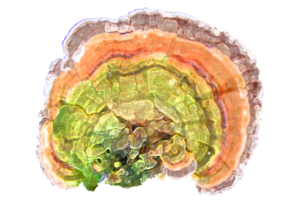Deng Pana, Dan Zhangb, Jiasheng Wuc, Congheng Chena, Zhixue Xua, Hongjie Yangb, Ping Zhou
Abstract
Diabetic nephropathy (DN) is the major cause of morbidity among diabetic patients. Thus, antidiabetic drugs with protection potential in the kidneys would have a higher therapeutic value. The effects of a novel proteoglycan, named FYGL, isolated from G. lucidum fruiting bodies, on the kidney function were investigated systematically in present work. FYGL (250 mg/kg) not only dosedependently reduced the blood glucose concentration (23.5%, p < 0.05), kidney/body weight ratio (23.6%, p < 0.01), serum creatinine (33.1%, p < 0.01), urea nitrogen (24.1%, p < 0.01),urea acid contents (35.9%, p < 0.01) and albuminuria (30.7%, p < 0.01)of DN mice compared to the untreated DN mice but also increased the renal superoxide dismutase (75.3%, p < 0.01), glutathione peroxidase (35.0%, p < 0.01) and catalase activities (58.5%, p < 0.01) compared to the untreated DN mice. The decreasing of renal malondialdehyde content (34.3%, p < 0.01) and 8-hydroxy-2′-deoxyguanosine expression (2.5-fold, p < 0.01) were also observed in FYGL-treated DN mice compared to the untreated DN mice, along with an amelioration of renal morphologic abnormalities. We conclude that FYGL confers protection against the renal functional and morphologic injuries by increasing activities of antioxidants and inhibiting accumulation of oxidation, suggesting a potential nutritional supplement for the prevention and therapy of DN.
Copyright © 2013 Elsevier Ltd. All rights reserved.
Reference:
Food and Chemical Toxicology, Volume 63, January 2014, Pages 111–118

